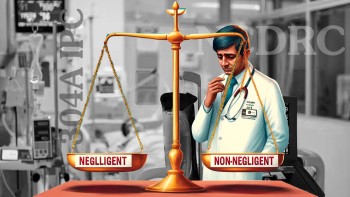Considering the act of treating doctor and hospital grossly negligent, NCDRC has recently imposed a fine of 25 Lakh on both.The husband of the deceased patient as well as the OPs had appealed to NCDRC against the decision of the state commission in which a compensation of 12 Lakh was awarded.Complaint was also made in the State Medical Council and to the state govt besides the criminal case against the treaing doctor and the hospital.
In the order dated 12th January 2024 NCDRC has mentioned- "The facts and the manner in which the patient was handled clearly indicate gross medical negligence on the part of the Doctor as well as on the part of the Hospital administration in the manner in which the events and incident of blood transfusion compounded the worsening situation of the patient.
Brief facts of the case-
The deceased patient was the wife of the complainant .They visited the doctor, who was arrayed as the opposite party no. 1 in the complaint for getting the deceased patient examined for severe gynaecological problems. The doctor prescribed pathological tests and ultrasonography of the lower abdomen. The same was assessed on 19.04.2010 and accordingly the patient was advised to undergo hysterectomy. The opposite party no. 1, doctor performed the same through laparoscopic method (TLH) on 23.04.2010. Post-operative, the condition of the patient deteriorated and she became unconscious on 25.04.2010 and was shifted to another hospital in Kolkata where she expired the next day, i.e., 26.04.2010. The cause of death indicated in the death certificate was distributive shock and Disseminated Intravascular Coagulation (blood clotting) in a case of TLH (total laparoscopic hysterectomy).
Also Read-
The complaitant alleged before the State Commission that-
01. Firstly the very attempt and advice of hysterectomy was against usual norms without attempting any alternative medicinal treatment. The advice for surgery was hasty and was performed in a hurried manner.
02.The second contention of the complainant was that the patient was having low haemoglobin and hypertension, yet the surgery was undertaken by the opposite party no. 1 casually without exercising due diligence. It was further submitted that in spite of pathological and other clinical reports indicating a high blood pressure of 140/100 mg and very low haemoglobin percentage of 6% mg/dl, the same was overlooked and the doctor went ahead with the surgery which was yet another aspect of negligence.
03. The next submission made was that the opposite party no. 1 and under her directions by the hospital staff one bottle of blood was transfused to the patient on 25.04.2010 which had been carelessly stored in the ward refrigerator and was severely infected. As a matter of fact the patient immediately collapsed on the transfusion of this contaminated blood that was the final nail in the coffin.
Also Read-
Jaipur to Host National Medicolegal Summit in April this Year
With the aforesaid allegations the complainant also led evidence and filed documents to support the submissions and also relied on the medical expert opinion reports that was brought on record to demonstrate that finally the death of the patient occurred on account of the contaminated blood apart from the other deficiencies as indicated above.
The defence taken by the doctor and the hospital was that all due care was taken and medicines were prescribed to control high blood pressure. The haemoglobin according to the defence was 9.0 mg/dl as per the blood report dated 24.04.2010 and was 11.3 mg/ dl on 25.04.2010. Thus, even post-operative, the haemoglobin level of the patient was normal and was not alarming.
Expert Opinion -
Opinion of the expert before the state commission was that the management of the above-mentioned patient had not been correct.The expert had categorically and lucidly mentioned that the patient should have been evaluated by a Cardiologist & Anaesthetist pre-operatively. After 2 units of blood transfusion the Hb% should have been repeated and blood transfusion given accordingly. D&C, being a minor operation could have been done & the patient put on medical treatment, if at all required, thereafter and proper preparation hysterectomy could have been done, if required. Pre-operative USG report showed a bulky uterus (102 x 63 x 43) mm with no evidence of Fibroid Uterus & HPE report also did not find any evidence of Fibroid Uterus or other pathology, requiring urgent hysterectomy. The operation was hurriedly done without adequate preparation. Furthermore, on 23.4.2010 (day of operation) the patient was transfused with 2 units of blood again no note of any adverse reaction & the time of completion of transfusion. On 24.4.2010 the Hb% is noted as 9 gm% therefore, there does not appear to be any justification for blood transfusion and the sequlae of unfortunate events followed the 5th unit of blood transfusion. It is observed that the packets of blood transfusion were brought from the blood bank on 22.4.10 and stored in the Nursing Home. This is not correct blood should not be stored other than in the blood bank. Thus the treatment rendered is substandard and the flaws in the management have been documented above."
Order by State Commission-
The State Commission after assessing the documents on record came to the conclusion that there was clear negligence on the part of the doctor and the hospital in transfusing blood that was stored in a routine hospital fridge and reliance was placed on the West Bengal Medical Council report dated 24.11.2017 to record medical negligence resulting in deficiency on that count. The State Commission allowed the complaint by directing the opposite party no. 1 to pay a sum of Rs.8,00,000/- as compensation with a further liability of Rs.4,00,000/- on the hospital on the same count. Aggrieved by the aforesaid orders, both the parties filed their respective appeals in the NCDRC.
Decision of State Medical Council was also against the doctor.The Council unanimously found the charged medical practitioner guilty of infamous conduct in a professional respect. As regards the quantum of punishment, the Council unanimously decided that the charged medical practitioner must be WARNED."
After considering opinion of experts and arguments from both sides the NCDRC ordered that, "It is evident from all the aforesaid facts on record that there was gross negligence having accumulative effect right from the stage of the planning of the surgery till the culminating of entire episode with the allegations arising out of the contaminated blood transfusion resulting in the death of the patient."
Reliance was also placed in this case on an opinion given under the Right to Information Act by the concerned Department of Government of West Bengal which categorically mentioned that Nursing Homes are prohibited from the permission of setting up of Blood Storage Unit for storing of blood.
"It is, thus, evident that the blood which was kept for 3 days in the ward refrigerator of the Hospital was apparently in violation of the aforesaid Government instructions" mentioned NCDRC in the final judgment.
The Pacemakers toook opinion of experts on the judjment.Dr Raj Shekhar Yadav,Senior Physician and State convenor UPCHAR says that as per guidelines of NACO blood should be stored between 2-6 degree C. Once the blood bags are taken out of blood bank they should either be transfused within 30 minutes or should be stored at 2-6 degree C in a refrigerator approved for the purpose at a place authorised to store blood.Common ward refrigerators are not permitted to store blood.Blood stored at temperature beyond this range carries a high chance of bacterial contamination and hemolysis leading to severe transfusion reaction and sepsis.In this case blood was stored for three days in ward refrigerator which is violation of rules.
When asked to comment on the order Medico Legal expert and Lawyer Dr Gaurav Aggarwal said," It is well known that Doctors have often been exploited and made to go through rigorous compensations in favour of the complainant-patients in courts of law, but even if one wants to speak in favour of the treating doctors in this case, the series of events and the facts suggest that more than one thing was definitely amiss. Even if doctors did their best for treatment of the patient, their lack of record keeping in managing the transfusion reaction goes against them. A transfusion reaction is not negligence per se but not having facilities to manage or not recording (in the case sheet papers) of the same amounts to deficiency in service indicating negligence. Secondly, it has been a long standing practice that if blood so requisitioned from a blood bank, is not utilised for whatever reasons (it does happen sometimes), then it is duly returned to the said blood bank as soon as possible. Failing to do so was another deficiency in service by treating doctors. Thirdly, the facts suggest that the indication of hysterectomy in the case itself is questionable as facts do not suggest a clear cut need of the same. Forthly, the indication of the blood transfusion is also questionable."
In summary, there are more than one instances of breach in duty of care by the treating doctors. But the mention of the court that anaesthesiologist should have assessed the patient before surgery may need to be expunged from the judgment as it is not possible to have a surgery without a pre-surgery assessment of the patient's condition by the anaesthesiologist as in all probability it would have been done. But then even if it is expunged, it will not have any effect on the judgment as other facts support breach in duty of care by the doctor(s), added Dr Gaurav after going through the order.
Access the original order here-
NATIONAL CONSUMER DISPUTES REDRESSAL COMMISSION NEW DELHI FIRST APPEAL NO. 183 OF 2019







Recent comments
Latest Comments section by users